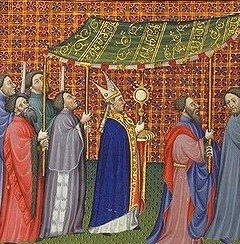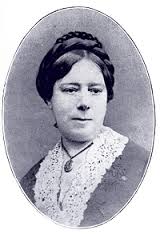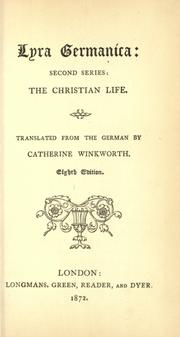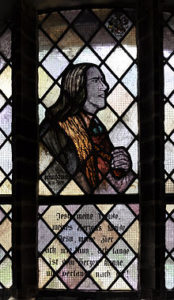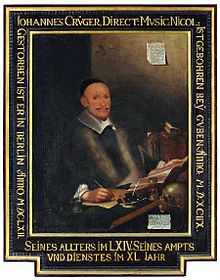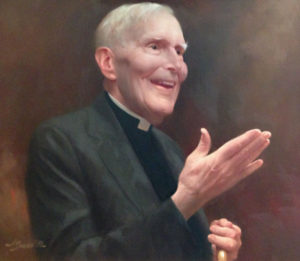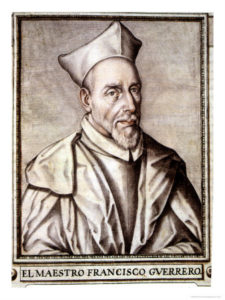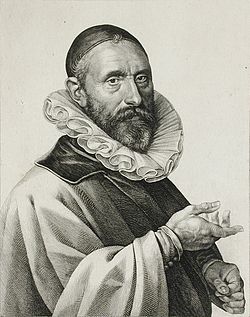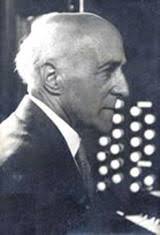Corpus Christi
Mount Calvary Church
of the Roman Catholic Personal Ordinariate of the Chair of Saint Peter
Baltimore, Maryland
Prelude: Le banquet céleste, Olivier Messiaen
Hymns
Deck thyself, my soul, with gladness.
O food to pilgrims given
Father, we thank thee who hast planted
Anthems
Caro mea vere est cibus, by Francisco Guerrero
O sacrum convivium, by Jan Pieterszoon Sweelinck
Postlude: Prelude and Fugue in A Major, BWV 536 – J.S. Bach
Common
Communion Service (Collegium Regale) by Harold Darke and Creed from the Missa de Angelis
____________________
Hymns
Deck thyself, my soul, with gladness. The original German text, Schmücke dich, o liebe Seele, was written by the German politician and poet Johann Franck (1618—1677) in the aftermath of the Thirty Years’ War. It expresses an intimate relationship between the individual believer and his Savior, Jesus Christ. Jesus, ascended into heaven, is still present as our food in this “wondrous banquet.” He is the fount, from whom our being flows as we receive Him and are filled with Him. He feeds us and transforms us into His likeness so that we become His joy and boast and glory before the heavenly court.
Catherine Winkworth
in her Lyra Germanica (1854).
Deck thyself, my soul, with gladness,
leave the gloomy haunts of sadness;
come into the daylight’s splendour,
there with joy thy praises render
unto him whose grace unbounded
hath this wondrous banquet founded:
high o’er all the heavens he reigneth,
yet to dwell with thee he deigneth.
Sun, who all my life dost brighten,
light, who dost my soul enlighten,
joy, the sweetest heart e’er knoweth,
fount, whence all my being floweth,
at thy feet I cry, my Maker,
let me be a fit partaker
of this blessed food from heaven,
for our good, thy glory, given.
Jesus, Bread of Life, I pray thee,
let me gladly here obey thee;
never to my hurt invited,
be thy love with love requited:
from this banquet let me measure,
Lord, how vast and deep its treasure;
through the gifts thou here dost give me,
as thy guest in heaven receive me.
Here is the 1674 text.
1. Schmücke dich, o liebe Seele!
Laß die dunckle Sünden Höle!
Komm ans helle Licht gegangen;
Fange herrlich an zu prangen.
Denn der Herr voll Heyl und Gnaden,
Wil dich itzt zu Gaste laden,
Der den Himmel kan verwalten,
Wil itzt Herberg’ in dir halten.2. Eile, wie Verlobten pflegen,
Deinem Bräutigam entgegen,
Der da mit dem Gnaden-Hammer
Klopfft an deine Hertzens-Kammer.
Oeffn’ ihm bald die Geistes-Pforten:
Red ihn an mit schönen Worten:
Komm, mein Liebster, laß dich küssen!
Laß mich deiner nicht mehr missen.3. Zwar in Kauffung theurer Wahren
Pflegt man sonst kein Geld zu sparen:
Aber du wilt für die Gaben
Deiner Huld kein Geld nicht haben:
Weil in allen Bergwercks-Gründen
Kein solch Kleinod ist zu finden,
Daß die Blut-gefüllte Schaalen
Und dis Manna kan bezahlen.4. Ach! wie hungert mein Gemüthe,
Menschen-Freund, nach deiner Güte!
Ach! wie pfleg’ ich offt, mit Thränen,
Mich nach de iner Kost zu sehnen!
Ach! wie pfleget mich zu dürsten,
Nach dem Tranck des Lebens-Fürsten!
Wünsche stets daß mein Gebeine
Sich durch Gott mit Gott vereine.5. Beydes Lachen und auch Zittern
Lässet sich in mir itzt wittern:
Das Geheinmiß dieser Speise,
Und die unerforschte Weise,
Machet daß ich früh vermercke,
Herr, die Grösse deiner Stärcke!
Ist auch wohl ein Mensch zu finden
Der dein’ Allmacht solt ergründen?6. Nein! Vernunfft die muß hier weichen,
Kan dieß Wunder nicht erreichen:
Daß diß Brodt nie wird verzehret,
Ob es gleich viel tausend nehret;
Und daß mit dem Safft der Reben
Uns wird Christi Blut gegeben.
O der grossen Heimligkeiten
Die nur Gottes Geist kan deuten!7. Jesu, meine Lebens-Sonne!
Jesu, meine Freud’ und Wonne!
Jesu, du mein gantz Beginnen,
Lebens-Quell und Licht der Sinnen!
Hier fall ich zu deinen Füssen!
Laß mich würdiglich gemessen
Dieser deiner Himmels-Speise,
Mir zum Heyl, und dir zum Preise!8. Herr, es hat dein treues Lieben
Dich vom Himmel abgetrieben,
Daß du willig hast dein Leben
In den Tod für uns gegeben,
Und darzu gantz unverdrossen,
Herr, dein Blut für uns vergossen,
Das uns itzt kan kräfftig träncken,
Deiner Liebe zu gedencken!9. Jesu wahres Brodt des Lebens!
Hilff, daß ich doch nicht vergebens,
Oder mir vielleicht zum Schaden
Sey zu deinem Tisch geladen!
Laß mich durch diß Seelen-Essen
Deine Liebe recht ermessen,
Daß ich auch, wie itzt auf Erden,
Mag dein Gast im Himmel.
The erotic imagery in the German was eliminated by Catherine Winkworth.
The original 1674 German text was written by
Johann Franck
Johann Franck (1618-1677) a was German poet, lawyer and public official. After his father’s death in 1620, Franck’s uncle by marriage, the town judge, Adam Tielckau, adopted him and sent him to schools in Guben, Cottbus, Stettin, and Thorn. On June 28, 1638, he enrolled at the University of Königsberg to study jurisprudence. This was the only German university left undisturbed by the Thirty Years’ War. Here his religious spirit, his love of nature, and his friendship with such men as the his poetic mentor, Simon Dach and Heinrich Held, preserved him from sharing in the excesses of his fellow students.
Johann Franck returned to Guben at Easter 1640, at his mother’s urgent request; she wished to have him near her in those times of war when Guben frequently suffered from the presence of both Swedish and Saxon troops. After his return from Prague, in May 1645, Franck embarked on a distinguished civic career as attorney, city councillor (1648) and Burgermeister (Mayor) (1661), and in 1671 (or 1670) was appointed as county elder of Guben in the margravate (Landtag – Diet)) of Lower Lusatia.
Johann Franck wrote both secular and religious poetry and published his first work, Hundertönige Vaterunsersharfe, at Guben in 1646. Almost his entire output is brought together in the two-volume Teutsche Gedichte. The first part, Geistliches Sion (Guben, 1672), contains 110 religious songs, provided with some 80 melodies. Bach composed 14 settings of seven of his texts, the most famous being the motet Jesu, meine Freude BWV 227.
Johann Crüger
The chorale melody associated with this text was composed by the German Lutheran theologian and musician, Johann Crüger (1598-1662). After passing through the schools at Guben, Sorau and Breslau, the Jesuit College at Olmütz, and the Poets’ school at Regensburg, he made a tour in Austria, and, in 1615, settled at Berlin. There, save for a short residence at the University of Wittenberg, in 1620, he employed himself as a private tutor till 1622. In 1622 he was appointed Cantor of St. Nicholas’s Church at Berlin, and also one of the masters of the Greyfriars Gymnasium. He died at Berlin Feb. 23, 1662. Crüger wrote no hymns, although in some American hymnals he appears as “Johann Krüger, 1610,” as the author of the supposed original of C. Wesley’s “Hearts of stone relent, relent”. He was one of the most distinguished musicians of his time. Of his hymn tunes, some 20 are still in use, the best known probably being that to “Nun danket alle Gott”, which is set to No. 379 in Hymns Ancient & Modern, ed.
Here is the Schola Cantorum of St. Peters-in-the-Loop singing the hymn.
____________________
O food to pilgrims given is a translation of O esca viatorum, an anonymous Latin hymn first published in 1647. In the first verse, we express the desire to unite with Christ by means of His body, the manna from heaven; in the second, by means of His blood, the fountain of living water that gives us eternal life. In the third verse, we desire the vision of Christ’s face unveiled, whose hidden presence we adore in the eucharistic species.
Here is the Liturgical Choir at the University of Notre Dame singing O esca viatorum. Here is a small choir at the National Shrine of the Immaculate Conception.
O food to pilgrims given,
O bread of life from Heaven,
O manna from on high!
We hunger, Lord, supply us,
Nor Thy delights deny us,
Whose hearts to Thee draw nigh.O stream of love past telling,
O purest fountain welling
From out the Savior’s side!
We faint with thirst; revive us,
Of Thine abundance give us,
And all we need provide.O Jesus, by Thee bidden,
We here adore Thee,
Hidden in forms of bread and wine.
Grant when the veil is riven,
We may behold, in heaven,
Thy countenance divine.
O esca viatorum,
O panis angelorum,
O manna coelitum,
Esurientes ciba,
Dulcedine non priva
Corda quaerentium,
Corda quaerentium.2. O lympha, fons amoris,
Qui puro Salvatoris
E corde profluis
Te sitientes pota,
Haec sola nostra vota,
His una sufficis,
His una sufficis.3. O Jesu, Tuum vultum,
Quem colimus occultum
Sub panis specie,
Fac, ut remoto velo
Post libera in caelo
Cernamus facie,
Cernamus facie.
(Digression on feminist translations. Usually, attempts to eliminate the hated words man, men, he, him, his etc. from Scripture and hymns leads to bad and sometimes absurd English. The older translation of O esca viatorum in the 1940 Hymnal was O food of men wayfaring, an exact translation of viatorum: via -way, masculine plural –orum. It fits the meter, but is not very good English. From feminist motives, it was changed to to pilgrims given, but I must confess this is a rare, if not unique, example of an improvement. A wayfarer may be a wander (I am a wayfaring stranger), but a pilgrim is on a way, The Way, El Camino, and has a goal.)
The melody is O Welt, ich muβ dich lassen, itself a contrafactum of Innsbruck, ich muβ dich lassen, by
Heinrich Isaac (c. 1450 – 1517)
He was a Nederlandish composer of south Netherlandish origin. He wrote masses, motets, songs (in French, German and Italian), and instrumental music. A significant contemporary of Josquin des Prez, his influence was especially pronounced in Germany, due to the connection he maintained with the Hapsburg court. He was the first significant master of the Franco-Flemish polyphonic style who both lived in German-speaking areas, and whose music was widely distributed there. It was through him that the polyphonic style of the Netherlands became widely accepted in Germany, making possible the further development of contrapuntal music there. His best known composition is Innbruck, ich muss dich lassen.
Here is Flos Campi singing O Welt, ich muβ dich lassen, the Lutheran contarfactum; here is (are?) the Vocafonia ; here is a male choir from Baltimore’s St. Paul’s School, Brooklandville, singing in Old St. Paul’s on Charles St; here are the Wiltener Sängerknaben.
A Digression on Contrafacta
The absence of contrast between ‘secular’ and ‘sacred’ styles of music in the Middle Ages] can be shown simply by the observation that a secular song, if given a set of sacred words, could serve as sacred music, and vice versa. Only recently has it been recognized how frequently such interchange took place, and the more we learn about medieval music, the more important it becomes. The practice of borrowing a song from one sphere and making it suitable for use in the other by the substitution of words is known as “parody” or contrafactum.’
The contrafactum (plural contrafacta) may operate in either direction: to provide pious words to fit a secular song, or profane words to fit a religious song. It may involve ‘parody’ in the literary sense, offering purposeful variations on the words of the original song, but sometimes there may be only a more general contrast in content between the two songs, or even no obvious relationship at all between them. Although in some cases it is possible to tell which came first, the religious or the secular version, in others it is less clear in which direction the process operated.
Examples of this can be found particularly in Goliardic verse, which sometimes parodies the forms of hymns and the church services; for instance, the first line of the sixth-century Latin hymn for Prime, Iam lucis orto sidere, which celebrates control of both the emotions and the appetites (potus cibique parcitas, ‘restraint in food and drink’), is borrowed to introduce a twelfth-century drinking song:
Iam lucis orto sidere
Deum precamur supplices
ut in diurnis actibus
Nos servet a nocentibus . . . Now at the dawning of the day
To God as suppliants we pray
That from our daily round he may
All harmful beings keep away . . .
becomes:
Iam lucis orto sidere
statim oportet bibere;
Bibamus nunc egregie
Et rebibamus hodie . . . Now at the dawning of the day
We must start drinking straight away;
Let’s drink now till the drink’s all gone,
And have another later on . . .
This kind of contrafactum becomes commoner in the later Middle Ages; it is particularly associated, from the early thirteenth century onwards, with the work of the friars, who often supplied pious words to be sung to popular secular tunes (a device later to be taken over, for similar reasons, by the Salvation Army, on the principle ‘Why should the Devil have all the best tunes?’). St Francis described his followers as joculatores Dei, ‘God’s minstrels’. An example of this can be found in the Red Book of Ossory(Bishop’s Palace, Kilkenny), which includes 60 Latin lyrics in two hands of the late C14, accompanied by a note:
Attende, lector, qu[o]d Episcopus Ossoriensis fecit istas cantilenas pro vicariis Ecclesie Cathedralis sacerdotibus et clericis suis ad cantandum in magnis festis et solaciis, ne guttura eorum et ora Deo sanctificata polluantur cantilenis teatralibus, turpibus et secularibus, et cum sint cantatores prouideant sibi de notis conuenientibus secundum quod dictamina requirunt.
Be advised, reader, that the Bishop of Ossory [the Franciscan friar Richard de Ledrede, d. 1360] has made these songs for the vicars of the cathedral church, for the priests, and for the clerks, to be sung on the important holidays and at celebrations in order that their throats and mouths, consecrated to God, may not be polluted by songs which are lewd, secular, and associated with revelry, and, since they are trained singers, let them provide themselves with suitable tunes according to what these sets of words require.
Twenty five of the Latin lyrics are on the Nativity or related themes, 11 on Easter and the Resurrection, one on the Annunciation, the rest on various devotional topics. Some of them are accompanied by introductory fragments of English or French verse, whose form (though not content) they seem to echo: e.g. the first line of the popular dance-song ‘Maiden on the moor’ (‘A maiden stayed on the moor for a full week and a day . . .’) prefaces a lyric on the Nativity:
Maiden in the mor lay,
in the mor lay,
seuenyst[es] fulle,
seuenist[es] fulle.
Maiden in the mor lay–
in the mor lay–
seuenistes fulle,
[seuenistes fulle,
fulle] ant a day… Peperit virgo,
Virgo regia,
Mater orphanorum,
Mater orphanorum,
Peperit virgo,
Virgo regia,
Mater orphanorum,
mater orphanorum,
Plena gracia… A virgin gave birth,
A royal virgin,
Mother of orphans,
Mother of orphans,
A virgin gave birth,
A royal virgin,
Mother of orphans,
Mother of orphans,
Full of grace…
Good King Wenceslaus was set to the the spring carol Tempus adest floridum; What Child is This to a ballad about a woman of dubious virtue –Greensleeves; the Star Spangled Banner to a drinking song To Anacreon in Heaven [try hitting those high notes after 6 glasses of port]. Contemporary composers use it. “Come to Me,” also known as “Fantine’s Death,” is sung in the first act of Les Miserables. “On My Own,” the contrafactum of “Come to Me,” is performed during the second act of the show. “Comme d’habitude,” music by Claude François and Jacques Revaux, has original French lyrics by Claude François and Gilles Thibaut, and was rewritten as “My Way” with English lyrics by Paul Anka. In Japan, the Scots song “Auld Lang Syne” has a new set of words in the song “Hotaru no hikari” (lit. “The light of the firefly”), which is used at graduation ceremonies (inscrutable). There are of course many ad hoc parodies when students discover that O my darling Clementine has the same meter as Tantum ergo.
____________________
Father, we thank thee who hast planted is a translation by the Episcopal poet and presbyter Francis Bland Tucker (1896—1984; UVA 1914) of a portion of the Didache (c. 110 AD) that describes the manner of celebrating the Eucharist: “concerning the broken bread. We thank thee, our Father, for the life and knowledge which thou hast made known unto us through Jesus thy Son; to thee be the glory forever. As this broken bread was once scattered on the mountains, and after it had been brought together became one, so may thy Church be gathered together from the ends of the earth unto thy kingdom.” Some scholars think these prayers may even predate many of the writings of the New Testament.
Here at St. John’s, Detroit, before a Tigers game.
Father, we thank Thee who hast planted
Thy holy name within our hearts.
Knowledge and faith and life immortal
Jesus, Thy Son, to us imparts.
Thou, Lord, didst make all for Thy pleasure,
Didst give us food for all our days,
Giving in Christ the Bread eternal;
Thine is the pow’r, be Thine the praise.Watch o’er Thy Church, O Lord, in mercy,
Save it from evil, guard it still,
Perfect it in Thy love, unite it,
Cleansed and conformed unto Thy will.
As grain, once scattered on the hillsides,
Was in this broken bread made one,
So from all lands Thy Church be gather’d
Into Thy kingdom by Thy Son.
Francis Bland Tucker (1885-1984) was an important figure in hymnody. He was educated at the University of Virginia and the Virginia Theological Seminary. Beginning in 1945, he was Rector of Christ Church in Savannah, Georgia. Tucker served on the two commissions, forty-two years apart, that revised hymnals of the Episcopal Church. He worked on the 1940 Hymnal and the 1982 Hymnal which includes 17 of Tucker’s contributions. Among these are the texts, Oh, Gracious Light (Hymns 25-26), Father, We Thank Thee Who Hast Planted (Hymns 302-303), and his original text, Our Father, by Whose Name (Hymn 587). Only John Mason Neale is credited with more items in the 1982 Hymnal. Tucker was also a theological adviser to the commission that produced the 1979 Book of Common Prayer.
A collateral descendant of George Washington, Tucker’s parents were Beverley Dandridge Tucker, Episcopal Bishop of Southern Virginia, and Anna Maria Washington who was one of the last children to be born at Mount Vernon. Francis Bland is the brother of Henry St. George Tucker (1874–1959), 19th Presiding Bishop of the Episcopal Church and descendant of St. George Tucker (1752–1827), lawyer, legal scholar, state and federal judge for whom the St. George Tucker House in Colonial Williamsburg is named.
__________________
Anthems
Caro mea vere est cibus: et sanguis meus vere est potus. Qui manducat meam carnem et bibit meum sanguinem in me manet, et ego in illo.
My flesh is meat indeed, and my blood is drink indeed. Whoever eats my flesh and drinks my blood abides in me, and I in him.
(Here sung in the Sistine Chapel)
by
Francisco Guerrero (1528-1599)
Guerrero’s early musical education was with his older brother Pedro. At the age of 17 he was appointed maestro de capilla (singing master, i.e. music director) at Jaén Cathedral. A few years later he accepted a position in Seville. During this time he was much in demand as a singer and composer, establishing an exceptional reputation before his thirtieth birthday; in addition he published several collections of his music abroad, an unusual event for a young composer.
After several decades of working and traveling throughout Spain and Portugal, sometimes in the employ of emperor Maximilian II, he went to Italy for a year (1581–1582) where he published two books of his music. After returning to Spain for several years, he decided to travel to the Holy Land, which he finally was able to do in 1589. On the return trip his ship was twice attacked by pirates, who threatened his life, stole his money, and held him for ransom. He was able to return to Spain; unfortunately he had no money, and endured a series of misfortunes, including some time spent in prison for debt. At last his old employer at Seville Cathedral extricated Guerrero and he resumed working for them. Of all the Spanish Renaissance composers, he lived and worked the most in Spain. \
_______________
O sacrum convivium, in quo Christus sumitur; recolitur memoria passionis ejus; mens impletur gratia; et futurae gloriae nobis pignus datur.
O sacred banquet, wherein Christ is received; the memorial of his passion is renewed; the soul is filled with grace; and a pledge of future glory is given to us.
(Here sung by the choir of Clare College, Cambridge)
Jan Pieterszoon Sweelinck (1562-1621)
Sweelinck started work at 15 and worked in the same church (where his grandfather and uncle had been organists) his whole life. On his death his son took over his job.
According to Cornelis Plemp, a pupil and friend of Sweelinck’s, he started his 44-year career as organist of the Oude Kerk in 1577, when he was 15. Sweelinck’s first published works date from around 1592–94: three volumes of chansons, the last of which is the only remaining volume published in 1594. Sweelinck then set to publishing psalm settings, aiming to set the entire Psalter. These works appeared in four large volumes published in 1604, 1613, 1614 and 1621, teh year of his death. His popularity as a composer, performer and teacher increased steadily during his lifetime. Contemporaries nicknamed him Orpheus of Amsterdam and even the city authorities frequently brought important visitors to hear Sweelinck’s improvisations.
___________________
Communion Service
by
Harold Darke (1888-1976)
Harold Edwin Darke was born in London, October 29, 1888, and died in Cambridge, November 28, 1976. Darke received his formal training at the Royal College of Music, where he studied composition with Charles Villiers Stanford, and at Oxford. He had a world-wide reputation as one of the finest organists of his era. He held positions at Emmanuel Church, West Hampstead (1906) and subsequently at St. James, Paddington. During his fifty years (1916-66) as organist at St. Michael’s, Cornhill (London), his weekly recitals, which included the entire organ works of Bach, made him a city institution. In 1919 he founded the Saint Michael’s Singers and remained its conductor until 1966. In his choral festivals he presented not only established masterworks, but championed the music of little-known contemporary composers such as Vaughan Williams and Charles Hubert Parry. Darke’s numerous compositions are mostly, but by no means exclusively, choral and organ works. They are generally serious and reflective in character. His most famous work is the Christmas song In the bleak midwinter.
Here is the Sanctus from his Communion Service in F, sung at Baltimore’s St. Michael and All Angels Church sometime in the 1950s.
